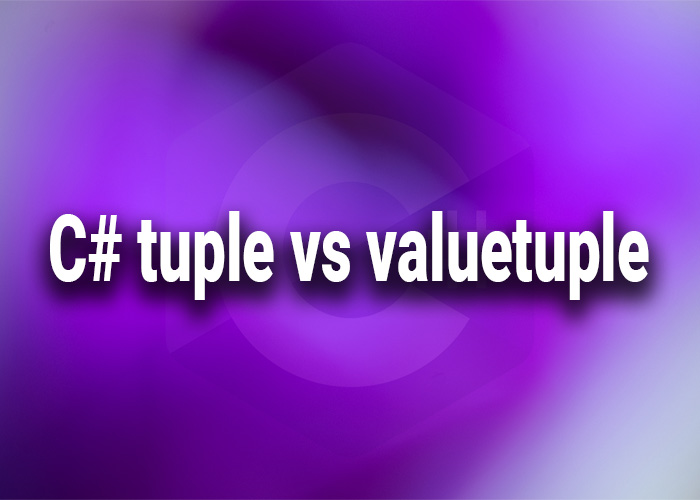Understanding the Differences Between Tuple and ValueTuple in C#
In C#, both Tuple and ValueTuple serve as data structures that can hold a fixed number of elements. However, they differ significantly in terms of their underlying implementation, performance, and usage. This article will delve into these differences, helping you choose the right tuple type for different scenarios in your C# applications.
What is a Tuple?
Introduced in .NET Framework 4.0, Tuple is a class that provides an easy way to store a set of values. Tuples are immutable and are reference types, which means they are stored on the heap. This traditional tuple type allows you to group multiple elements of possibly different types into a single object.
What is a ValueTuple?
Introduced in C# 7.0 as part of .NET Framework 4.7 and .NET Core, ValueTuple brings a value type version of the traditional tuple. It is designed to be a lightweight alternative to Tuple and is stored on the stack instead of the heap, which can lead to improved performance, especially in scenarios involving large numbers of tuples or high-frequency use.
Key Differences
1. Type and Memory Allocation
- Tuple: A reference type that incurs a heap allocation, which can lead to more garbage collection overhead.
- ValueTuple: A value type that is typically allocated on the stack, leading to lower memory overhead and potentially faster access times.
2. Mutability
- Tuple: Immutable by design. Once created, the values within cannot be changed.
- ValueTuple: Mutable, allowing you to change the values of the elements after creation, which can be advantageous or risky depending on how it's used.
3. Performance
- ValueTuple generally offers better performance due to its value-type nature, resulting in fewer allocations and reduced pressure on the garbage collector.
- Tuple may involve more overhead because of heap allocations and the immutability constraints which require new objects for any modification.
4. Syntax and Features
- Tuple uses a somewhat verbose syntax and does not support features like deconstruction directly.
- ValueTuple supports a simpler, more flexible syntax, can be easily deconstructed into separate variables, and supports defining element names at initialization.
Usage Scenarios
When to Use Tuple
- When you need immutable collections of items.
- In public APIs where data structure stability and immutability are required.
- When working with older .NET frameworks that do not support ValueTuple.
When to Use ValueTuple
- In performance-critical sections of code where allocations need to be minimized.
- For temporary data grouping inside methods, particularly when data is modified often.
- When you prefer syntactic features like easy deconstruction and inline element naming.
Code Examples
Using Tuple
var person = new Tuple<string, int>("John Doe", 30);
Console.WriteLine($"Name: {person.Item1}, Age: {person.Item2}");
Using ValueTuple
var person = (Name: "John Doe", Age: 30);
Console.WriteLine($"Name: {person.Name}, Age: {person.Age}");
// Deconstruction
var (name, age) = person;
Console.WriteLine($"Deconstructed - Name: {name}, Age: {age}");
Conclusion
The choice between Tuple and ValueTuple in C# should be guided by your specific needs regarding performance, mutability, and framework compatibility. While ValueTuple offers performance benefits and syntactic sugar conducive to cleaner code, Tuple provides immutability and broad compatibility. Understanding these differences enables developers to make informed decisions that enhance the efficiency and readability of their C# applications.





